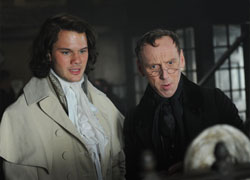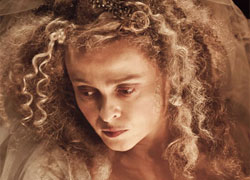
Top stories





Marketing & MediaWarner Bros. was “nice to have” but not at any price, says Netflix
Karabo Ledwaba 1 day

More news

Logistics & Transport
Maersk reroutes sailings around Africa amid Red Sea constraints

















Celebrating Dickens' bicentenary celebrations with passion and vigour, the vast three-volume magnum opus of Victorian literature, has been skilfully adapted by David Nicholls, who adapted Sam Shepard's stage play Simpatico for the big screen - and also adapted his novel One Day; Nicholls has mastered the art of adaptation and also has a perfect understanding of bringing characters to life in all their flawed glory (a great payoff of his three-year stint at the Royal National Theatre where he understudied and played small parts). Newell's spectacular realisation of Nicholls' text is invigorating and has an undeniable charm, affording us an opportunity to become a part of the world that Dickens created in 1860.
Dickens' classic Romeo and Juliet tale about a boy who passionately yearns to capture the love of a girl whose heart has been turned into ice, is vintage BBC and British filmmaking at its best. Newell also reverted to Dickens' ambiguous revised original ending of his novel, a further homage to its rich heritage that has been celebrated on film, television, stage and in spinoff novels since the dawning of cinema.
Production designer Jim Clay, who won two BAFTAs for Alfonso Cuaron's The Children of Men and Christabel, excels triumphantly in his creation of the diverse worlds of Dickens' characters, allowing their world to reflect their internal struggles as well as their conflicted natures.
The characters are further brought to life through the delicious costume designs by Beatrix Pasztor, an award-winning costume designer who, in a career running over two decades, has created some of the most iconic costumes of our time, repeatedly working with Gus van Sant on the likes of Drugstore Cowboy, My Own Private Idaho, To Die For, Psycho, Even Cowgirls Get The Blues and Good Will Hunting, as well as Terry Gilliam's The Fisher King.
The spectacular and awesome visual impact of Great Expectations is delivered by cinematographer John Mathieson, an award-winning director of photography who has won countless awards for Ridley Scott's Gladiator and a British Society of Cinematographers Award for Phantom of the Opera. The connection and visual transitions between the real worlds and tormented flashback on Great Expectations are fantastically interwoven with style and adequate cadence by editor Tariq Anwar, who won a slew of awards for The King's Speech and American Beauty, amongst other projects.
The emotional journey of the characters, the romance, suspense and dramatic intensity is brilliantly underscored by Richard Hartley, allowing for an experience we can not only see, but feel as well.

Newell's Great Expectations is an utterly charming coming-of-age story that takes us on a journey that is as relevant today as when Dickens first came up with an idea, which he called "such a very fine, new and grotesque idea", a "grotesque tragi-comic conception", that saw the birth of characters that have become a part of our lives: the vulnerable and beguiling Pip, the capricious Miss Havisham, the cold and beautiful Estella, Joe the kind and generous blacksmith, the dry and sycophantic Uncle Pumblechook, Mr Jaggers, Wemmick and his dual personality, and the eloquent and wise friend, Herbert Pocket.
Great Expectations has the magic ingredient that makes classic stories immortal, speaking a universal language of first love, scorned love, loss, hope and the longing to be part of a family and become your own person. We can relate to and fully understand as the typical Dickensian themes unfold: wealth and poverty, love and rejection, and the eventual triumph of good over evil. Some of the major issues that Great Expectations successfully portray are Pip's involvement with a broad range of classes, from criminals like Magwitch to the extremely rich like Miss Havisham, as well as our young hero's relentless ambition and internal struggle with his conscience.

Newell's casting is perfect and he has achieved his goal in selecting actors "who would dive into their characters as deeply as they were able to do, so you could absolutely believe how unlucky they were to have their stories woven together".
Jeremy Irvine, who earned praise last year for his leading performance in Steven Spielberg's WWI epic War Horse, delivers a passionate performance in the role of Pip, a young man torn between two worlds. Irvine absolutely captures Pip's innocence and the heart and soul of an incredibly ambitious and driven young man, someone who has been the victim of really horrendous physical and mental abuse growing up and he is horribly bullied in childhood.
English actress Holliday Grainger, who was most recently seen in the latest film adaptation of Anna Karenina, impresses as Estella, a young girl capable of love but far too terrified of the idea of it, because she has always been told that it is going to hurt her. The chemistry between Grainger and Irvine results in an emotional bonding, capturing the outcry of a girl who thinks she is not worthy or good enough for his love and is drawn to him because Pip is the only person who has ever shown her any affection.
Helena Bonham Carter delivers a tour de force as the iconic Miss Havisham, who drastically influences and steers the course of both Estella and Pip's lives and becomes aware of the damage she has caused to both of them. It is refreshing that the filmmakers moved away from the notion that Miss Havisham is an old crone, who is actually 37 in the novel when Pip first meets her. Bonham Carter offers an intimate encounter with a woman who is a lonely, tortured, anguished woman, troubled, and not being witchy and malicious.
One of Dickens' most memorable characters, the terrifying convict Magwitch, is brought to life with immense intensity by Ralph Fiennes, who worked with Newell on Harry Potter and the Goblet of Fire and will always be remembered as the Nazi officer Amon Goeth in Schindler's List. One of the UK's most prolific and respected film and television actors, Robbie Coltrane is delicious as the ruthless lawyer Mr Jaggers; fans will remember him as Hagrid in the Harry Potter films.
Jason Flemyng is terrific as Joe Gargery, adding another great performance in a successful career that includes memorable roles in the films X:Men: First Class, Layer Cake, Mean Machine, Snatch and Lock Stock and Two Smoking Barrels. Equally memorable are Olly Alexander as Pip's foe and friend Herbert Pocket, Sally Hawkins is an absolute scream as Mrs Joe, with Little Britain's David Walliams, one of Britain's best-loved actors, writers and comedians as Mr Pumblechook, and Toby Irvine, the younger brother of Jeremy Irvine, plays young Pip.
If you are looking for first-rate escapism that offers a magnificent journey into the heart and soul of Dickens' Great Expectations, expect nothing less but heartfelt and wholesome entertainment the entire family can enjoy, and Dickens' gurus can revel in.

Like many other Dickens novels, Great Expectations has been filmed for the cinema or television numerous times, including two silent films; David Lean's celebrated 1946 version, a 1974 version with Michael York as Pip; Anthony Hopkins played Magwitch with Jean Simmons in Kevin Connor's 1989 film; Alfonso Cuarón's update in 1998 was set in contemporary New York, and renamed Pip to Finn and Miss Havisham to Nora Dinsmoor; Charlotte Rampling stepped into the shoes of Miss Havisham in 1999. It was also seen on television as a two-part series in 1954, there was the 1967 BBC series, a BBC television serial in 1959, 1981 and 2011, and an animated children's version in 1983.
Stage versions have included productions include the 1939 London stage adaptation made by Alec Guinness, which was to influence David Lean's 1946 film, in which both Guinness himself and Martita Hunt reprised their stage roles. Cyril Ornadel's 1975 West End Musical featured Sir John Mills and won the Ivor Novello Award for Best British Musical; Graham McLaren's latest West End adaptation written by Jo Clifford (the filmed production is screened locally from August 16).
There were also some bizarre spinoffs including Great Expectations: The Untold Story (1986), depicting the adventures of Magwitch in Australia; Sherri Browning Erwin' book series Grave Expectations: The Classic Tale of Love, Ambition, and Howling at the Moon (2011) features Pip as a werewolf in love with Estella, a slayer of his kind, driven on by the vengeful vampire Miss Havisham; and New Zealand author Lloyd Jones reshaped the plot and wrote the novel Master Pip in 2006.
"It has always been my favourite book," said screenwriter David Nicholls, "the one I have been back to time and time again. I have read it a million times and I have always loved it ever since I was about 13 years old. It is not a thing I'd have expected to adapt, though."
Returning to the book for the first time in a decade, Nicholls was struck by the intricacy of the plotting and Dickens' skill as a mystery writer. "I hadn't read the book for about 10 years when I was offered the job," he recalled, "and I took time to reread it and one thing that struck me was how brilliant the plot is. Pip in the last part of the novel becomes almost like a detective. I love the idea of Pip unravelling the truth."
Nicholls said that for all the novel's thematic complexity, "such a large part of the story is just about the struggles of a 19-year-old boy, trying to work out who he is and what he wants to be, and I think in condensing the action a little in the screenplay, we have added to that sense of it being a thriller and a mystery." The writer's love of film noir was in the forefront of his mind when writing the script, "the idea of Miss Havisham holding the key, the idea of a femme fatale, the dark house that holds secrets. A lot of those ideas seem to me draw upon film noir, mystery and the gothic so I think there is a great deal of that in there but also I hope that we have clung onto the brilliant, sharp social satire".
Read more at www.writingstudio.co.za/page1037.html.
